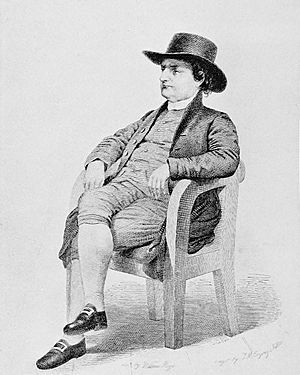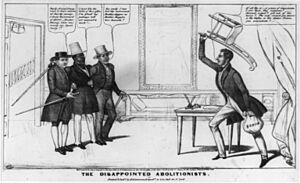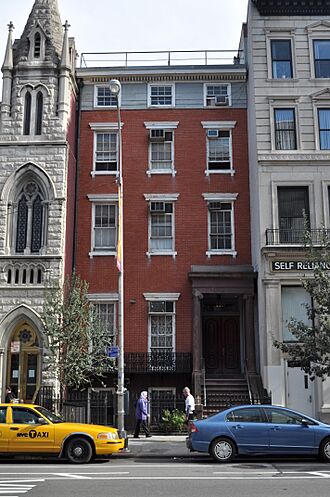Isaac Hopper facts for kids
Quick facts for kids
Isaac Tatem Hopper
|
|
|---|---|

Isaac Hopper in an 1898 drawing
|
|
| Born | December 3, 1771 |
| Died | May 7, 1852 (aged 80) New York City, New York, U.S.
|
| Nationality | American |
| Occupation | Helper of others, Children's Village co-founder |
| Spouse(s) | Sarah Tatum Hopper |
| Signature | |
Isaac Tatem Hopper (born December 3, 1771 – died May 7, 1852) was an American activist. He worked to end the system of forced labor in the United States. Hopper was very active in Philadelphia and New York City. He helped protect people who had escaped forced labor and free Black individuals from those who tried to capture them. He also helped start Children's Village, a place that supports children.
In 1829, he moved to New York City to manage a bookstore for the Quakers. Later, from 1841 to 1845, he served as a leader for the American Anti-Slavery Society. After 1845, he focused on improving prisons. He dedicated the rest of his life to the Prison Association of New York.
Contents
A Champion for Freedom and Justice
Isaac Tatem Hopper was born into a Quaker family in Deptford Township, New Jersey, in 1771. Quakers are a religious group known for their peaceful beliefs and commitment to equality. In 1795, he married Sarah Tatum Hopper. They had ten children together. Among them was Abigail Hopper Gibbons, who also became a notable activist. His grandson, DeWolf Hopper, became well-known too.
Isaac Hopper became a Hicksite Quaker, following the teachings of Elias Hicks. In 1827, he and his family moved their church membership to the Darby Friends Meeting.
Early Life and Quaker Beliefs
After the American Revolutionary War, the state of Pennsylvania ended the system of forced labor. This happened before the end of the 1700s. Philadelphia, a major port city in Pennsylvania, became a destination for people escaping forced labor from the Southern states. It was also a path for them to travel through.
In the years before the American Civil War, Philadelphia faced a serious problem. People known as "slave kidnappers" often came to the city. They would try to capture free Black children to sell them into forced labor. They also hunted for people who had escaped forced labor to return them to their former owners for money. Isaac Hopper bravely helped save about 3,300 people from this terrible fate.
Fighting Against Forced Labor
Hopper became a very active and important member of the Pennsylvania Abolition Society. Members of this group worked hard to protect the rights of African Americans. They also sought to end the system of forced labor across the United States. Over time, Hopper became known in Philadelphia as a trusted friend and advisor to Black communities. He helped them in all kinds of difficult situations.
Protecting People in Philadelphia
Isaac Hopper also oversaw the Negro School for Children in Philadelphia. This school was started by an early activist named Anthony Benezet before the Revolutionary War. It continued to operate throughout the 1800s. Hopper also volunteered his time as a teacher. He taught in a free school for African-American adults.

Community Helper and Educator
Hopper was one of the people who started a society to help poor people find jobs. He also served as the secretary for this group. He volunteered as a prison inspector, checking on conditions in prisons. He was a member of a fire company. He also acted as a guardian for young people learning a trade who were being mistreated.
Isaac and his wife, Sarah, had a large family. Despite their limited money, they often welcomed other Quakers who were struggling. Their children learned early on the importance of caring for others. Hopper also handled many tasks for the Society of Friends (Quakers).
Moving to New York and New Work
In 1829, Hopper moved his family to New York City. There, he managed a bookstore set up by the Hicksite Quakers. In the fall of 1830, he traveled to Ireland and England for family business. At first, some Quakers in those countries were unsure about him. They knew him as someone who had caused "trouble" among Friends in America. However, his kind and friendly personality soon changed their minds.
By the spring of 1841, fewer people were buying Hicksite books. Hopper then took on a new role. He became the treasurer and book agent for the American Anti-Slavery Society in New York.
Improving Prisons and Justice
In 1845, Isaac Hopper left his positions with the Anti-Slavery Society. He then dedicated the rest of his life to the Prison Association of New York. This organization worked to improve prisons and the justice system. His married daughter, Abigail Hopper Gibbons, who also lived in New York, followed in his footsteps. She founded the Women's Prison Association to work for prison reform.
A Family Legacy of Reform
Abigail also started a home for women who had been released from prison. This home helped them get back on their feet and rejoin society. She named it the "Isaac T. Hopper Home" in honor of her father.
Isaac Hopper often visited Albany, the capital of New York. He went there to represent the Prison Association and speak to lawmakers. Judge Edmonds, a friend of Hopper's, described his speeches. He said Hopper's words were simple but very powerful. If he told a funny story, everyone laughed. If he spoke seriously, the room became completely silent. If he spoke sadly, people would cry.
Hopper often asked for prisoners to be pardoned (forgiven for their crimes). Governor John Young of New York once told him, "Friend Hopper, I will pardon any convict whom you say you truly believe I ought to pardon." Isaac described one such trip in a letter to his daughter Susan. He and Judge Edmonds went to Albany in 1846 to get a special law passed. The committee members encouraged him to keep talking as he shared stories and explained the need for prison reform.
Isaac Hopper passed away in New York City on May 7, 1852.
 | James Van Der Zee |
 | Alma Thomas |
 | Ellis Wilson |
 | Margaret Taylor-Burroughs |


